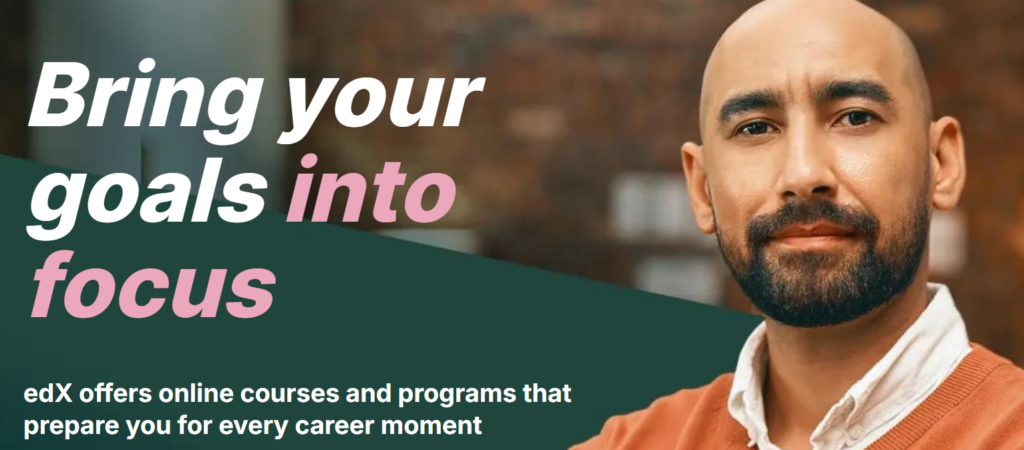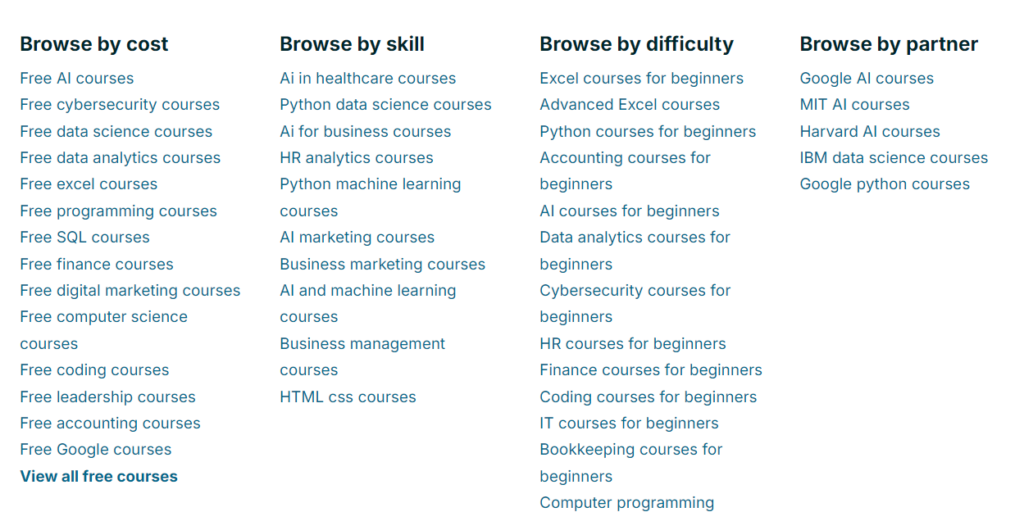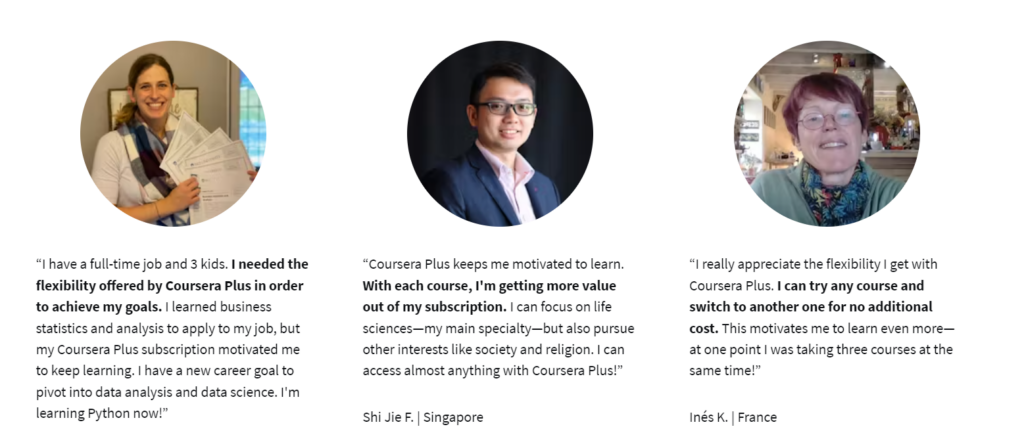Introduction
In the age of digital learning, online education platforms like edX and Coursera have revolutionized how we access and engage with knowledge. Both platforms offer a diverse range of courses, professional certificates, and even degree programs from prestigious universities and organizations worldwide. As they provide high-quality education to millions of learners, choosing between edX and Coursera can be challenging. While both platforms aim to make learning accessible, they differ in their course offerings, learning experiences, pricing structures, and the nature of their partnerships with academic institutions.
In this detailed comparison, we’ll explore the key aspects of edX and Coursera, including their features, course offerings, pricing models, and how they cater to different learning needs. By the end of this post, you’ll have a clear understanding of what each platform offers and which one aligns better with your educational goals.
Overview
edX was founded in 2012 by Harvard University and MIT with the goal of providing high-quality education to learners around the globe. It is a nonprofit organization that partners with more than 160 institutions, including top universities like Harvard, MIT, Stanford, and Berkeley, as well as leading companies like Microsoft and IBM. edX offers a diverse range of courses, professional certificates, MicroMasters programs, and even fully accredited online degrees. Its courses cover a wide range of subjects, including computer science, business, humanities, health, and more. edX emphasizes academic rigor and often mirrors the curriculum of its partner universities, making it an ideal platform for learners seeking university-level education and professional development.

Coursera, on the other hand, was founded by Stanford professors Andrew Ng and Daphne Koller in 2012. Like edX, Coursera partners with top universities and companies to provide high-quality courses, specializations, professional certificates, and degree programs. Coursera’s mission is to provide universal access to world-class learning, and it has quickly become one of the largest online learning platforms in the world. With partnerships from institutions like Yale, Stanford, Google, and IBM, Coursera offers a broad spectrum of courses across various disciplines, including technology, business, data science, personal development, and more. Coursera is known for its flexible learning paths, practical skill-building, and professional certifications that can enhance career prospects.

Features
edX Features
- High-Quality Academic Courses: edX collaborates with top universities and institutions to offer high-quality academic courses. These courses are designed and delivered by experts, often mirroring the curriculum of on-campus classes. This makes edX a go-to platform for learners seeking university-level education in a wide range of subjects.
- Variety of Learning Paths:
- Individual Courses: edX offers standalone courses across various fields, from computer science and engineering to humanities and health. These courses range from beginner to advanced levels, catering to different learning needs.
- Professional Certificate Programs: edX provides professional certificate programs that consist of a series of courses designed to help learners develop job-ready skills in areas like digital marketing, project management, and data analysis.
- MicroMasters Programs: These are graduate-level programs that offer in-depth learning in specific subjects. MicroMasters programs can serve as a pathway to a full master’s degree at participating universities.
- Online Master’s Degrees: edX offers fully accredited online master’s degree programs in fields such as computer science, business, and public health, in partnership with leading universities.
- Flexible and Self-Paced Learning: Many edX courses are self-paced, allowing learners to study at their own pace and on their own schedule. This flexibility is ideal for working professionals, students, and anyone with a busy lifestyle.
- Interactive and Engaging Learning Experience: edX courses include video lectures, readings, quizzes, assignments, and hands-on projects to provide a comprehensive learning experience. The platform also offers discussion forums where learners can engage with peers and instructors.
- Verified Certificates and Academic Credit: edX offers verified certificates upon successful completion of many courses. Additionally, certain programs like MicroMasters and online degrees offer academic credit, which can be applied toward a full degree at participating institutions.
- Financial Assistance: edX offers financial aid to eligible learners who cannot afford the cost of verified certificates. This initiative makes edX more accessible to a wider audience, fulfilling its mission of providing quality education to everyone.
Coursera Features
- Comprehensive Course Offerings: Coursera provides a wide range of courses across various disciplines, including technology, business, data science, arts, and personal development. With thousands of courses available, learners can find subjects that align with their personal and professional goals.
- Diverse Learning Programs:
- Individual Courses: Coursera offers individual courses on topics ranging from coding and data science to wellness and personal development. These courses are suitable for learners of all levels, from beginners to advanced professionals.
- Specializations: Specializations are series of related courses designed to help learners master a specific skill. They typically culminate in a hands-on Capstone Project that allows learners to apply what they have learned.
- Professional Certificates: Developed in partnership with industry leaders like Google, IBM, and Meta, these certificate programs are designed to provide learners with practical, job-ready skills in fields such as IT, data science, and digital marketing.
- Online Degrees: Coursera offers fully accredited bachelor’s and master’s degree programs from renowned universities. These programs provide a flexible and cost-effective way to earn a degree from a top institution.
- Flexible Learning and Guided Projects: Coursera offers a mix of self-paced courses and those with fixed schedules. Many courses provide flexible deadlines, allowing learners to progress at their own pace. Additionally, Coursera offers guided projects—short, hands-on projects that help learners apply skills in real-world scenarios.
- Certifications and Recognition: Coursera provides certificates upon course and program completion, which can be added to LinkedIn profiles or resumes. These certificates are recognized by employers and can enhance career prospects. Coursera’s professional certificates, particularly those from companies like Google and IBM, are highly regarded in the job market.
- Interactive Learning and Peer Review: Coursera emphasizes an interactive learning experience through video lectures, quizzes, assignments, peer-reviewed projects, and community forums. This approach helps learners actively engage with the material and receive feedback on their progress.
- Free Courses and Financial Aid: Coursera offers many free courses in audit mode, allowing learners to access course materials without paying. However, to receive a certificate, learners need to pay a fee. Coursera also provides financial aid and scholarships for eligible learners, making its courses more accessible.
Pricing
edX Pricing
edX offers a range of pricing options based on the type of course or program:
- Audit Mode: Most edX courses can be accessed for free in audit mode. This allows learners to access course materials, including video lectures and readings, without paying. However, learners in audit mode do not receive a certificate upon completion and may have limited access to graded assignments and exams.
- Verified Track: To earn a verified certificate and access additional features, learners can enroll in the verified track. The cost typically ranges from $50 to $300 per course, depending on the course length and content.
- Professional Certificate Programs: These programs usually cost between $200 and $1,500 for the entire series of courses, providing a comprehensive learning experience and a professional certificate upon completion.
- MicroMasters Programs: MicroMasters programs are priced between $600 and $1,500. Completing a MicroMasters program can provide credits toward a full master’s degree at participating institutions.
- Online Master’s Degrees: edX offers fully accredited online master’s degrees in partnership with universities. The cost varies depending on the program and institution but typically ranges from $10,000 to $25,000.
- Financial Assistance: edX offers financial aid to eligible learners who cannot afford the cost of verified certificates, providing up to a 90% discount on course fees.

Coursera Pricing
Coursera provides flexible pricing models across different learning paths:
- Free Courses: Many Coursera courses can be audited for free, allowing learners to access course materials without paying. However, certificates and access to graded assignments require payment.
- Individual Course Purchase: Individual courses typically cost between $29 and $99. This fee includes access to graded assignments and a certificate upon completion.
- Specializations and Professional Certificates: Specializations and professional certificates are subscription-based, typically costing $39 to $79 per month. The total cost depends on how long it takes to complete the program.
- Coursera Plus: For $399 per year, Coursera Plus offers unlimited access to over 90% of courses on the platform. This subscription is ideal for learners who want to take multiple courses or specializations throughout the year.
- Online Degrees: Coursera’s online degree programs vary in cost, ranging from $9,000 to $45,000, depending on the institution and the degree program.
- Financial Aid and Scholarships: Coursera provides financial aid and scholarships for learners who cannot afford the course fees. Eligible learners can apply for financial aid directly through the Coursera platform.

FAQs
Can I earn university credit on edX and Coursera?
edX: Yes, certain edX programs like MicroMasters and some online degrees offer the opportunity to earn university credit. These credits can often be applied towards a full degree at participating institutions.
Coursera: Yes, Coursera offers university credit for specific courses and programs, particularly through its online degree offerings. Credits earned can contribute toward completing a degree program.
Do edX and Coursera provide certificates?
edX: Yes, edX offers verified certificates for many of its courses upon successful completion. The certificates can be added to resumes and LinkedIn profiles to showcase your achievements.
Coursera: Yes, Coursera provides certificates for individual courses, specializations, and professional certificates. These are widely recognized and can enhance career prospects.
Which platform is better for career advancement?
edX is ideal for those seeking university-level education and academic credit, making it a strong choice for individuals aiming for academic achievements or transitioning to a new career path.
Coursera is well-suited for professional development, offering industry-recognized certifications and practical skills training. It’s a great choice for those looking to enhance their career prospects or gain specific job-ready skills.
Can I access courses offline on edX and Coursera?
edX: Yes, edX offers offline access through its mobile app, allowing learners to download video lectures and learn on the go.
Coursera: Yes, Coursera also provides offline access through its mobile app, enabling learners to download course content and study offline.
Do both platforms offer financial aid?
edX: Yes, edX offers financial aid for eligible learners, providing discounts of up to 90% on verified certificates.
Coursera: Yes, Coursera provides financial aid and scholarships for learners who cannot afford the course fees. Applications can be submitted directly through the platform.
Conclusion
edX and Coursera are two of the leading online learning platforms that have made high-quality education accessible to learners worldwide. edX is known for its academic rigor and university-level courses, offering a wide range of subjects through partnerships with top universities. It is ideal for learners seeking structured, in-depth education, academic credit, and pathways to advanced degrees. edX’s offerings include individual courses, professional certificates, MicroMasters programs, and fully accredited online degrees, making it a comprehensive platform for both personal enrichment and career advancement.
Coursera, on the other hand, provides a broader spectrum of courses that cater to both academic and professional learning. With its extensive range of individual courses, specializations, professional certificates, and online degree programs, Coursera is well-suited for learners seeking practical, job-ready skills. Its partnerships with industry leaders like Google, IBM, and Meta offer professional certificates that are highly valued in the job market, making Coursera a go-to platform for career enhancement and professional development.
In deciding between edX and Coursera, consider your learning objectives, preferred learning style, and career goals. If you are looking for academic rigor, university-level education, and pathways to advanced degrees, edX is an excellent choice. However, if you aim to acquire practical skills, earn industry-recognized certifications, and enhance your career prospects, Coursera offers a more flexible and career-focused learning experience. Both platforms provide valuable educational opportunities, empowering learners to pursue knowledge and skills that can transform their personal and professional lives.


